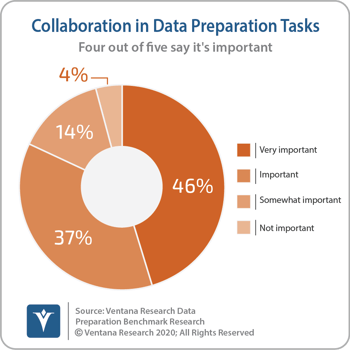Every organization performing analytics with multiple employees needs to collaborate. They should be collaborating in the analytics process and in communicating the results of those analyses. As I continue my evaluation of analytics and data vendors, I have to admit some disappointment at the level of collaborative capabilities some analytics vendors provide. To be fair, the level of capabilities vary widely, but I expected collaborative capabilities to be more uniformly available as a standard feature in analytics technologies by now. I had anticipated that three-quarters of analytics vendors would include collaboration capabilities. More than half the vendors I have evaluated support some comments and discussion in their products, only a few have incorporated social recognition and wall posting as part of their collaborative capabilities. So, what impact does a lack of analytics collaboration have on organizations undergoing digital transformation?
Analytics is a team sport. They are rarely conducted by a single individual and they don’t happen in a vacuum. Each person involved in the analytics process should be able to share information with others, question others and endorse certain approaches or individuals. This process happens regardless of the platform, but analytics technologies should be supporting these activities explicitly with built-in collaborative capabilities or with tight integrations to third-party collaborative tools. Not only will these capabilities result in better decisions by facilitating the exchange of information, but they will make it easier to train new individuals and share valuable techniques throughout an organization.
Some analytics vendors tout the ability to share analyses among colleagues as “collaboration.” Many of those vendors also support emailing an analysis to colleagues. While these capabilities certainly support sharing, technology can support much richer forms. Various social media tools introduced concepts such as follows, wall posting, broadcast messages, likes, comments and ratings. These all make the collaborative process much more meaningful and help capture information that becomes an important source of tribal knowledge for the organization.
A sample scenario that I use to articulate the value of analytics collaboration is where employees want to “follow” the analyses of their group to make sure they understand the group’s performance. Or they may want to follow others to learn new approaches or to gauge trends across products, groups or regions. If a particular analysis or data source has many likes, employees may want to explore that analysis and data source as well. If an employee doesn’t understand a particular analysis, they may want to read the wall postings and comments to learn how others are using it. These social media “indicators” can also be used as part of a certification process that designates certain analyses as trusted.
The purpose of analytics is to improve some aspect of an organization’s operations. That means that the output of analytics, i.e., decisions, needs to be incorporated into operational workflows. As part of the analytics process, decisions should be communicated and the appropriate tasks should be assigned to individuals in the organization to execute on those decisions. Tasks may also be assigned on an ad-hoc basis to investigate a question about an analysis. Once tasks are assigned, the organization needs to track the status of the workflows and ensure the tasks are completed. If they are not completed in a timely manner, they should be escalated or reassigned. Analytics vendors with the most complete capabilities support these types of collaborative interactions.
Finally, the collaborative capabilities should span both data and analytics processes. Our benchmark research shows four out of five organizations consider collaboration.png?width=375&name=Ventana_Research_2020_Assertion_Collaboration%20(1).png) in data preparation tasks important. Data preparation is an integral part of analytics. Analysts should be able to ask data engineers about the sources being used in their analyses. Data engineers should be able to ask analysts how they intend to use information. Each should be able to explore the dialogue of the other to learn more about the upstream and downstream activities. Unfortunately, organizations often use different vendors for data preparation and integration than for analytics. While vendors may offer integration of data and analytics products, few offer collaborative capabilities across the vendor boundaries.
in data preparation tasks important. Data preparation is an integral part of analytics. Analysts should be able to ask data engineers about the sources being used in their analyses. Data engineers should be able to ask analysts how they intend to use information. Each should be able to explore the dialogue of the other to learn more about the upstream and downstream activities. Unfortunately, organizations often use different vendors for data preparation and integration than for analytics. While vendors may offer integration of data and analytics products, few offer collaborative capabilities across the vendor boundaries.

Collaborative capabilities are improving, but there is still much room for improvement. For example, mobile devices help bring communities together to collaborate, but they are much more effective at doing so when native notifications are supported. With notifications, participants in the collaborative process are made aware their input is required without even opening an application.
As an organization, you should be aware of the value of collaboration in your analytics processes. It can help your organization make better, more informed decisions. Robust collaboration can also lead to better execution of those decisions through tracking and assigning tasks to individuals. All the collaborative exchanges also provide a way to capture more institutional knowledge of how decisions are made and implemented. With this visibility, your organization can have better governance over decision-making processes. I encourage you to consider ways to use technology to add collaboration to your analytics processes.
Regards,
Dave Menninger


.png?width=375&name=Ventana_Research_2020_Assertion_Collaboration%20(1).png) in data preparation tasks important. Data preparation is an integral part of analytics. Analysts should be able to ask data engineers about the sources being used in their analyses. Data engineers should be able to ask analysts how they intend to use information. Each should be able to explore the dialogue of the other to learn more about the upstream and downstream activities. Unfortunately, organizations often use different vendors for data preparation and integration than for analytics. While vendors may offer integration of data and analytics products, few offer collaborative capabilities across the vendor boundaries.
in data preparation tasks important. Data preparation is an integral part of analytics. Analysts should be able to ask data engineers about the sources being used in their analyses. Data engineers should be able to ask analysts how they intend to use information. Each should be able to explore the dialogue of the other to learn more about the upstream and downstream activities. Unfortunately, organizations often use different vendors for data preparation and integration than for analytics. While vendors may offer integration of data and analytics products, few offer collaborative capabilities across the vendor boundaries.









